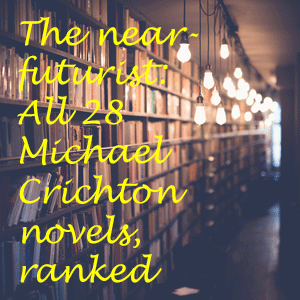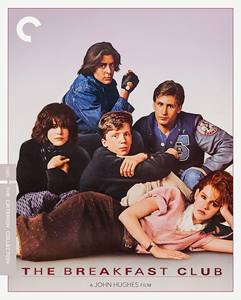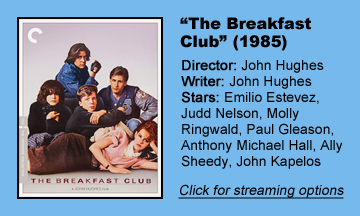A popular Twitter and Facebook game is to describe a classic movie in the most boring way possible. It’s easy to do with “The Breakfast Club” (1985): Five students spend eight hours in the school library. It’s such a boring premise that it seems like an Eighth Amendment violation for this quintet of high schoolers, and cruel and unusual punishment for viewers, too.
But in the follow-up to his clunky directorial debut, “Sixteen Candles” (1984), writer-director John Hughes has learned how to make a diamond out of coal.
Bonding in detention
Later inspiring similar bottle episodes of “Dawson’s Creek” and “Degrassi,” “The Breakfast Club” recognizes that detention is the one place outside of classrooms where kids from different cliques will spend time together (because they are forced to). In the school hallways, collectivization impulses reign.
Andrew (Emilio Estevez) can be found with the jocks, Brian (Anthony Michael Hall) with the geeks, John Bender (Judd Nelson) with the burnouts, Claire (Molly Ringwald) with the popular kids and Allison (Ally Sheedy) by herself.
Roughly speaking, little kids learn the concept of empathy, and adults 30 and older are locked in their ways. Teenagers are in the transitional period where ingrained selfishness battles with the notion of empathy, and internal personality rages against external pressures.
“The Breakfast Club” is a masterful illustration of this, especially in the scene that makes the whole movie, when the group sits in a circle on a second-floor balcony of the library.
We also get a master class in acting here: Estevez wondering how he could ever apologize for the humiliation he caused for the scrawny student whose butt cheeks he taped together; Ringwald insisting that she’s not being conceited, it’s simple reality that she’s popular; Hall admitting an embarrassingly bad suicide attempt; and Sheedy doling out shocking compulsive lies before admitting she came to Saturday detention because she had nothing better to do.
Sympathetic Bender
Up to this point, Nelson’s Bender had been the one we’re supposed to sympathize with. He comes from an abusive home, and although he’s skilled at getting under his classmates’ skin with provocative comments, this is his defense mechanism: He’s physically tough but emotionally fragile.
This is nicely shown when detention teacher Mr. Vernon (Paul Gleason) pulls Bender into another room and says he’ll beat him up once he’s an adult. I can’t take Vernon too seriously after his parodic reprise in “Not Another Teen Movie” (2001), but he stands as an iconic representation of a cruel, unsympathetic school authority figure.
But in the balcony scene, we’re in the same shoes as Bender, as it dawns on him that every kid has problems. I’m reminded of the “Buffy” episode “Earshot” when suicidal Jonathan has the epiphany that everyone is too busy with their own problems to worry about someone else.
Hughes, though, is more concerned with family’s effect on teens than the TV shows of a decade later would be. Even though “The Breakfast Club’s” parents are only seen dropping off and picking up their kids, the film is all about how they’ve shaped their offspring’s lives.

Family values
Andrew tries to live up to his demanding dad, not merely by excelling on the wrestling mat, but even by pulling pranks he thinks his dad would be proud of. Brian doesn’t want to crush his folks with his first ever “F” (in shop class), which drops his semester grade to an unfathomable “B.”
Claire’s dad is blatantly the reason for her detention, as he pulled her out of class for a shopping trip – a way to score points in the war against the mom. Bender’s dad beats him, and Allison’s folks ignore her.
We never get the parents’ POV on any of this, so it’s contextually important to know “The Breakfast Club” comes from Hughes, who had shown sympathy for The Dad Who Tries His Best in “Vacation” (1983). He also shows parents’ human fallibility in “Sixteen Candles,” when they forget Sam’s birthday.
“The Breakfast Club” is the second film – but the first great one – where Hughes treats teenagers’ problems with dramatic heft rather than as something to be laughed at. “Sixteen Candles” is arguably groundbreaking, but it’s a flawed piece of filmmaking.
Workmanlike effort
“The Breakfast Club” is both a blessed gem and a workmanlike project. Landing five actors with chemistry that sells an impossible idea – that kids from different high school cliques could become friends – is to some degree luck. The delicate score by Keith Forsey sets the appropriate tone along with the bookends of Simple Minds’ “Don’t You (Forget About Me).”
The ace in the hole is the editing by Dede Allen. It stretches logic that the previously hovering Vernon leaves the kids alone long enough to have not only the bonding session but also a dance montage (proving that Claire, unlike “Sixteen Candles’ ” Sam, can cut a serious rug) – although a case can be made that janitor Carl (John Capelos) distracts him on purpose for the sake of helping the kids.
In “The Breakfast Club,” Hughes breaks the “show, don’t tell” rule, and while he can get away with it thanks to the five stellar performances, there remains the fact that this is eight hours (97 minutes in film time) in a library.
Hughes and Allen find the right character beats, clashes and one-liners – or a key cutaway like Allison peeking under her brow or Bender being stunned into rare silence – to keep the momentum going. This is a bottle episode, but 1985 John Hughes proves to be a prime vintage.


